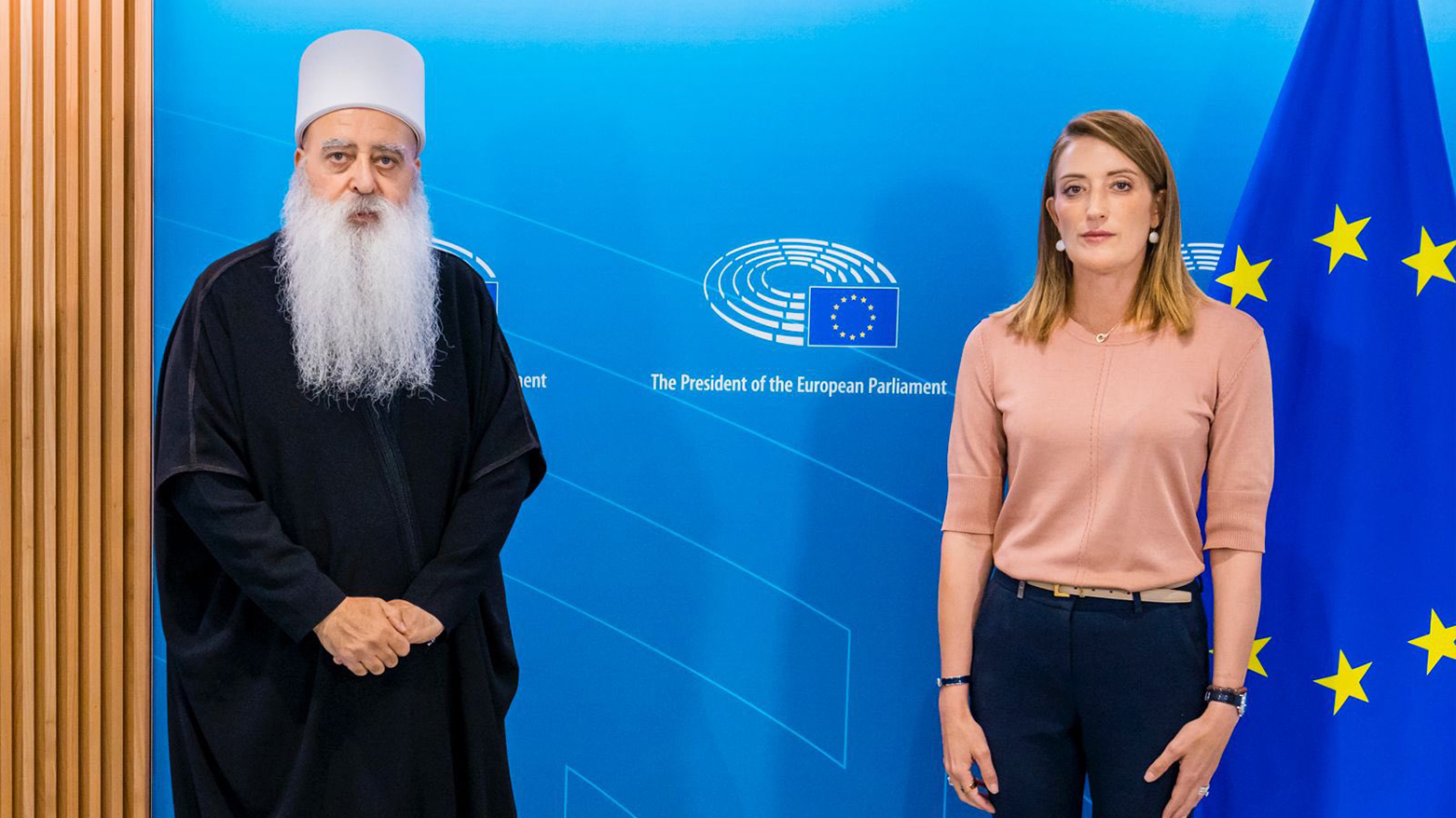European Parliament President Vows Support for Syria's Druze Amid Reports of Atrocities
European Parliament President Roberta Metsola has pledged full support for a just future for Syria after hearing of the plight of the Druze in Sweida. She stressed the need for humanitarian aid, protection for all communities, and the safe return of the displaced.

ERBIL (Kurdistan24) – In a powerful expression of solidarity with Syria's persecuted minorities, the President of the European Parliament, Roberta Metsola, has declared that the future of Syria "must be one of peace, safety & inclusivity for all its people," vowing the parliament's full commitment to supporting a just and inclusive future for the war-torn country.
Her statement, posted on the social media platform X on Tuesday, came after a meeting with the Spiritual Leader of the Druze Community, Sheikh Mowafaq Tarif, during which she heard "first-hand accounts of what the Druze community in Sweida are facing."
Metsola's pledge of support comes at a moment of profound crisis for the Druze community in southern Syria, which has been subjected to a wave of brutal sectarian violence that human rights organizations have described as including extrajudicial executions and crimes under international law. In her post, the European Parliament President "underlined the importance of swift humanitarian aid access, return of displaced & protection of all Syrians regardless of ethnicity or religion."
The future of Syria must be one of peace, safety & inclusivity for all its people.
— Roberta Metsola (@EP_President) September 2, 2025
With the Spiritual Leader of the Druze Community Sheikh Mowafaq Tarif, I listened to first-hand accounts of what the Druze community in Sweida are facing.
I underlined the importance of swift… pic.twitter.com/dGsArGTUST
The first-hand accounts shared with Metsola likely detailed the horrific events of July, when clashes between local Druze fighters and Sunni Bedouin tribes in Sweida province escalated dramatically, drawing in Syrian government forces.
As previously reported by Kurdistan24, while Damascus claimed its forces intervened to restore order, multiple sources, including the Syrian Observatory for Human Rights (SOHR) and Amnesty International, have alleged that government troops and allied militias sided with the Bedouin and carried out mass atrocities against Druze civilians.
The scale of the violence has been staggering. SOHR reported in late August that the death toll in the province had climbed to nearly 2,000, including the documented extrajudicial execution of 765 civilians, most of them Druze, by government forces and their allies.
The victims reportedly included women, children, and medical staff from Sweida National Hospital. Amnesty International, in its own investigation released on September 2, accused Syrian government forces of executing at least 46 unarmed Druze civilians in public squares, homes, a hospital, and even a school.
The rights group based its findings on verified video footage, photographs, and witness testimonies, stating that such acts constitute "extrajudicial executions" and "crimes under international law."
This wave of state-sponsored violence has served as a catalyst, pushing the Druze community toward a historic political shift. On August 31, the spiritual leader of Syria’s Druze, Sheikh Hikmat al-Hijri, issued an unprecedented call for independence, declaring that after exhausting all attempts at negotiation with Damascus, self-determination was the "only option left."
In an address, he announced that the community was making both military and political preparations for this new path. "We want independence, and this is beyond dispute," Sheikh al-Hijri stated. "We must live in dignity and in a way that reflects our culture, consistent with the values of free nations worldwide."
The call for Druze independence is part of a broader, growing movement among Syria's minority communities for decentralization and federalism as a safeguard against the abuses of a centralized state.
As reported by Kurdistan24, this push directly challenges the insistence of Syrian President Ahmed al-Sharaa on maintaining a strong central government, despite mounting evidence of atrocities being committed by forces under his command.
The violence in Sweida is part of a wider pattern of attacks that have also targeted Alawite and Christian communities in recent months, prompting Alawite figures to form their own political council and endorse a vision of federal democracy.
EU Parliament President Metsola’s direct engagement with the Druze spiritual leadership and her public commitment to their protection signals a growing international recognition of the severity of the crisis.
Her emphasis on humanitarian access is particularly critical, as residents have reported that the main road connecting Sweida to Damascus was closed for over a month following the violence, severely restricting the flow of essential goods. The call for the return of the displaced is equally urgent, as the violence has led to forced displacement and the burning of homes and businesses.
By reaffirming the European Parliament's "full commitment to supporting a just & inclusive future for Syria," Metsola has placed the plight of the Druze and other persecuted minorities firmly on the European agenda.
Her statement provides a crucial measure of international political support for a community grappling with immense trauma and an uncertain future, amplifying their calls for justice, protection, and a fundamental restructuring of the Syrian state that respects the rights and ensures the safety of all its citizens.